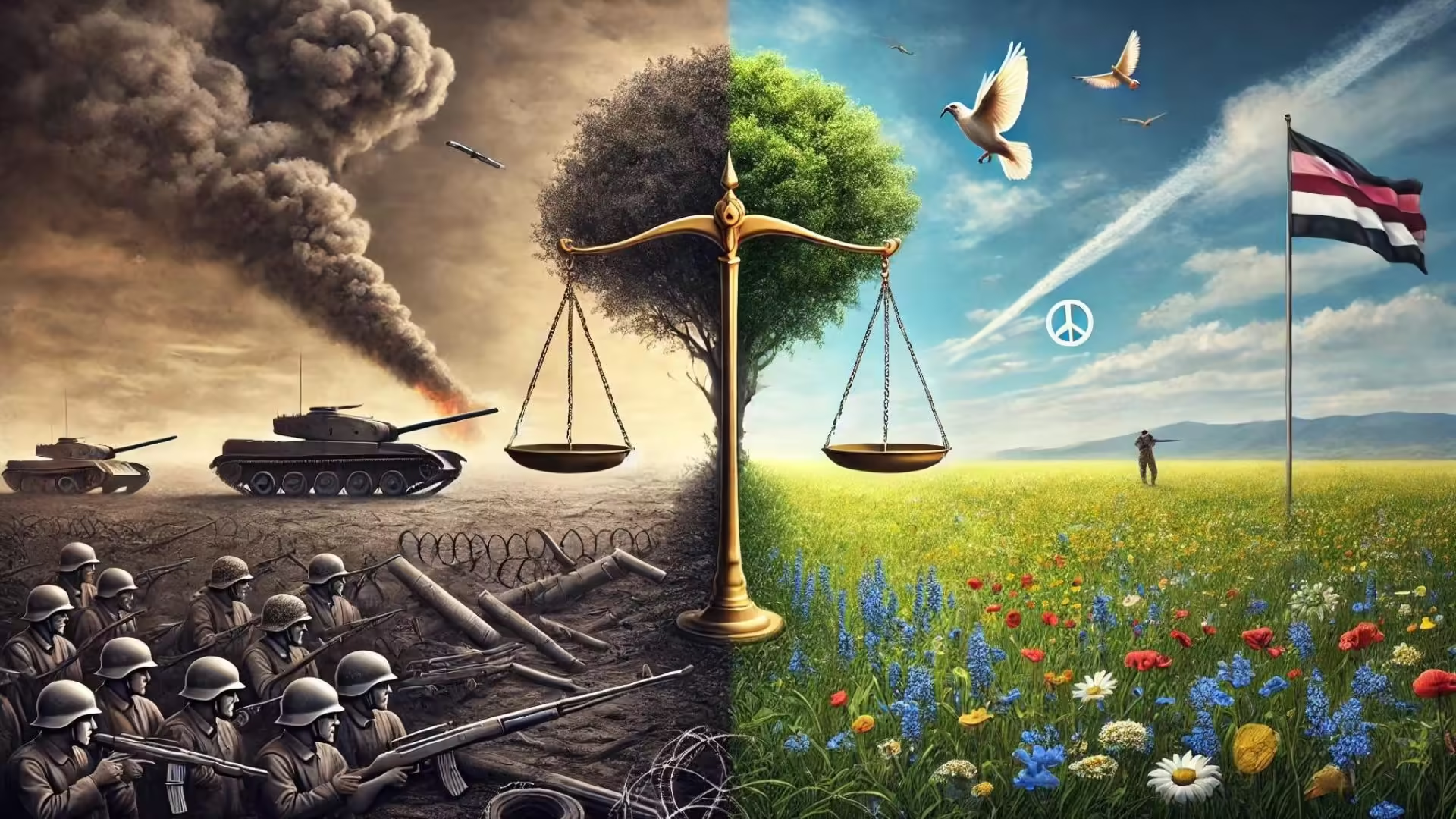War has been a constant presence throughout human history, shaping societies and altering the course of nations. Despite its devastating consequences, war raises a fundamental question: Is it ever justified? This complex issue touches on ethics, philosophy, and real-world scenarios, challenging us to examine the moral grounds on which wars are fought and the conditions under which they might be deemed necessary.
Historical Perspectives on War
Throughout history, wars have been fought for a multitude of reasons, including territorial expansion, resource acquisition, defense, and ideological conflicts. Some of the most significant wars have been justified by their proponents as necessary for preserving peace, defending human rights, or preventing greater evils.
For example, World War II is often cited as a justified war due to the necessity of stopping the aggressive expansion and atrocities committed by Nazi Germany. The war was framed as a battle against tyranny and genocide, with the Allied powers fighting to restore peace and justice.
Similarly, the American Civil War is often viewed as a conflict that was justified to end the inhumane institution of slavery and preserve the Union. In these cases, war was seen as a necessary means to achieve morally desirable ends.
Just War Theory
The philosophical framework known as Just War Theory provides criteria to evaluate whether a war can be morally justified. Developed by theologians and philosophers such as Augustine and Thomas Aquinas, this theory outlines conditions that must be met for a war to be considered just:
- Just Cause: The reason for going to war must be morally sound, such as self-defense or protecting innocent lives.
- Legitimate Authority: Only duly constituted authorities can declare a war.
- Right Intention: The intention behind the war must be to promote good or prevent evil, not for self-gain or revenge.
- Probability of Success: There must be a reasonable chance of success to justify the loss of life and resources.
- Proportionality: The violence and damage caused by the war must be proportionate to the goals achieved.
- Last Resort: All peaceful alternatives must have been exhausted before resorting to war.
Just War Theory provides a moral framework for assessing the justification of war, yet applying these principles is often fraught with complexity and subjectivity.
Ethical Dilemmas and Modern Conflicts
In contemporary conflicts, the question of whether war is justified becomes even more complicated due to factors such as terrorism, humanitarian intervention, and geopolitical interests. The lines between aggressor and defender can blur, and the motivations behind military actions can be difficult to discern.
For instance, humanitarian interventions, such as NATO’s intervention in Kosovo in 1999, are often justified on the grounds of preventing human rights abuses. However, these interventions raise ethical questions about sovereignty, the motivations of intervening powers, and the potential for unintended consequences.
The war on terror, initiated after the September 11 attacks, exemplifies the challenges of justifying war in a globalized world. While the goal of preventing terrorism is widely supported, the means and scope of military actions have been criticized for causing civilian casualties and infringing on civil liberties.
The Cost of War
Regardless of its justification, war inevitably brings about significant human, economic, and environmental costs. The loss of life, displacement of populations, and destruction of infrastructure have lasting impacts on societies and individuals. These consequences force us to weigh the potential benefits of war against its devastating costs.
Moreover, the psychological toll on soldiers and civilians alike can persist long after the conflict ends. The trauma experienced by those involved in war raises moral questions about the ethical responsibility of those who choose to engage in conflict.
The question of whether war is ever justified is complex and multifaceted. While historical examples and philosophical frameworks offer guidance, the justification of war ultimately depends on the specific circumstances and values of the time. As we continue to face new challenges and conflicts in the modern world, it is crucial to critically examine the motivations, consequences, and ethical considerations of war.
In exploring this topic, we are reminded of the importance of seeking peaceful solutions and preventing the conditions that lead to war. By understanding the complexities of war’s justification, we can strive to build a more just and harmonious world.
Expand Your Vocabulary
This section explores key words and expressions used in the article about the justification of war. Understanding these terms will enhance your comprehension of the article and help you incorporate them into your everyday English.
- Justification
Meaning: The action of showing something to be right or reasonable.
Context: The article discusses the justification of war, examining whether it can ever be morally acceptable.
Everyday Use: You might seek justification for a decision by explaining its benefits, such as “She provided justification for her actions by detailing the positive outcomes.” - Devastating
Meaning: Highly destructive or damaging.
Context: War is described as having devastating consequences, including loss of life and infrastructure.
Everyday Use: You might describe a natural disaster as devastating, like “The hurricane had a devastating impact on the community.” - Philosophical Framework
Meaning: A structured set of ideas and principles used to analyze and evaluate complex issues.
Context: Just War Theory is a philosophical framework for assessing the morality of war.
Everyday Use: You might use a philosophical framework to discuss ethical dilemmas, such as “Her argument was based on a philosophical framework of fairness and justice.” - Self-Defense
Meaning: The act of defending oneself, especially from physical harm.
Context: Self-defense is often cited as a just cause for going to war.
Everyday Use: You might use self-defense to describe protecting yourself from danger, like “He acted in self-defense when he pushed the attacker away.” - Proportionality
Meaning: The idea that the response to a situation should be appropriate and not excessive.
Context: Just War Theory includes proportionality, ensuring that the violence in war is proportionate to the goals achieved.
Everyday Use: You might discuss proportionality when considering punishment, such as “The penalty should reflect the severity of the crime, maintaining proportionality.” - Legitimate Authority
Meaning: A recognized and lawful power to make decisions and enforce rules.
Context: Only legitimate authorities can declare war according to Just War Theory.
Everyday Use: You might refer to legitimate authority when discussing governance, like “The mayor is the legitimate authority responsible for city policies.” - Sovereignty
Meaning: The authority of a state to govern itself without external interference.
Context: Humanitarian interventions often raise questions about the sovereignty of nations.
Everyday Use: You might use sovereignty to discuss a country’s independence, such as “The treaty respected the sovereignty of all participating nations.” - Civil Liberties
Meaning: Individual rights protected by law from governmental interference.
Context: The article mentions concerns about infringing on civil liberties during the war on terror.
Everyday Use: You might discuss civil liberties when talking about freedom of speech or privacy, like “The new policy raised concerns about its impact on civil liberties.” - Humanitarian Intervention
Meaning: The use of military force by a state or group of states to protect human rights in another state.
Context: Humanitarian interventions are justified as preventing human rights abuses.
Everyday Use: You might use humanitarian intervention to describe efforts to address crises, such as “The organization called for humanitarian intervention to aid the refugees.” - Ethical Responsibility
Meaning: The moral obligation to act correctly and make decisions that benefit society.
Context: The article raises questions about the ethical responsibility of those who choose to engage in war.
Everyday Use: You might consider ethical responsibility when making business decisions, like “Companies have an ethical responsibility to minimize their environmental impact.”
Let’s Talk
After exploring the justification of war and its ethical complexities, consider the following thought-provoking questions. Reflect on these questions and feel free to share your thoughts in the comments or discuss them with friends and family to deepen your understanding of the topic.
- What are some historical examples where war was justified, and what criteria were used to justify it?
- Can war ever truly be a last resort, or are there always alternative solutions to conflicts?
- How do modern conflicts challenge traditional ideas about the justification of war, especially with new technologies and global dynamics?
- In what ways can the principles of Just War Theory be applied to personal and societal conflicts to promote peaceful resolutions?
- How do cultural and historical perspectives influence our views on the justification of war?
- What are the potential consequences of labeling a war as unjustified, both for the nations involved and the international community?
- How can we balance the need for national security with the protection of civil liberties during times of conflict?
- What role should international organizations play in determining whether a war is justified, and how can they enforce their decisions?
- How can education and dialogue help prevent conflicts and promote a deeper understanding of the ethical considerations surrounding war?
- In what ways can individuals contribute to peacebuilding efforts and advocate for non-violent solutions to global challenges?
These questions encourage reflection on the complexities of war and its justification, fostering a deeper understanding of the ethical dilemmas we face in a world where conflict remains a reality.










0 Comments